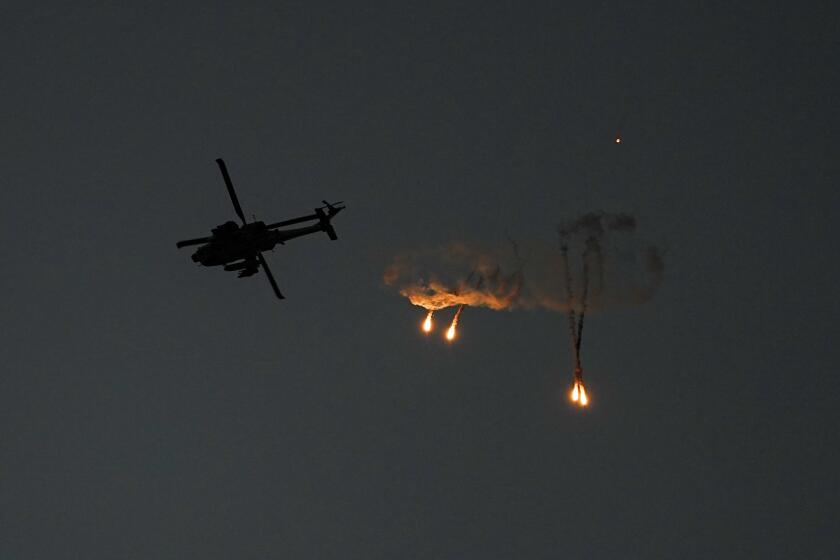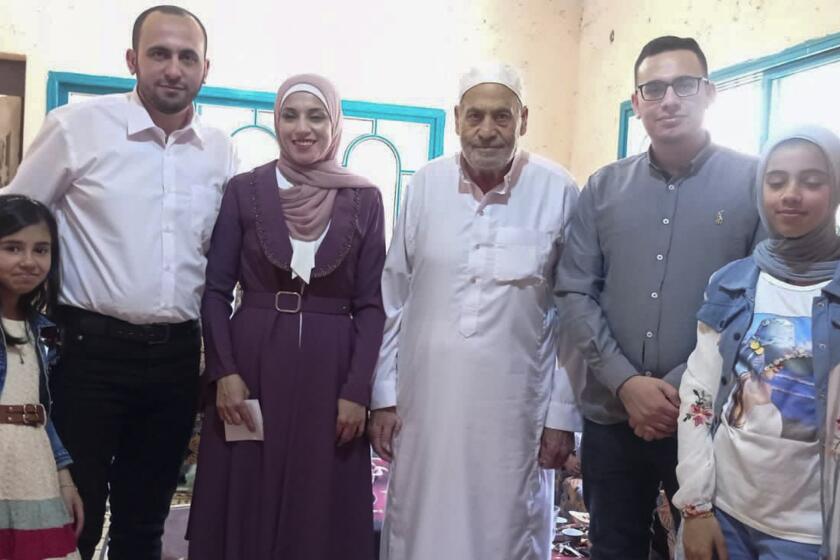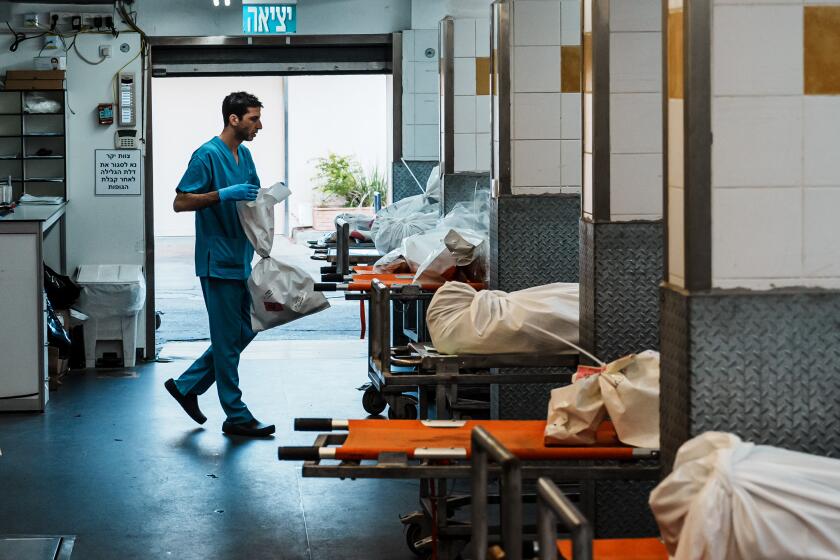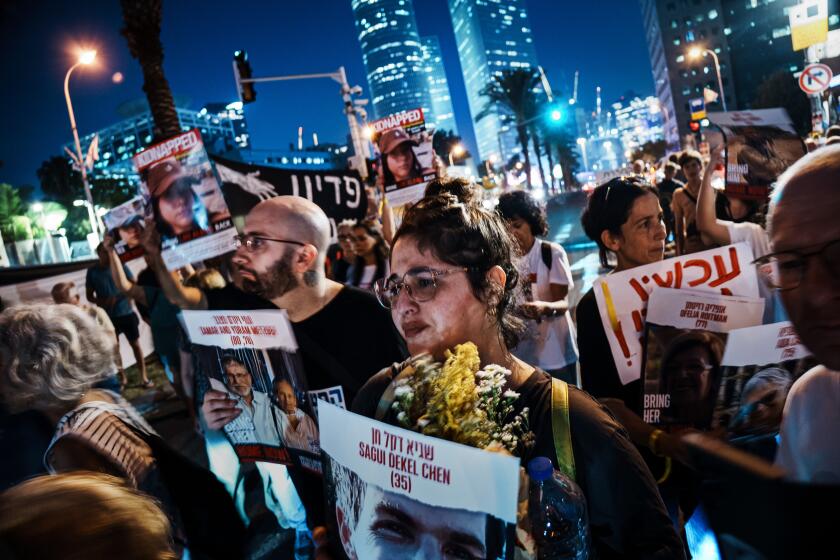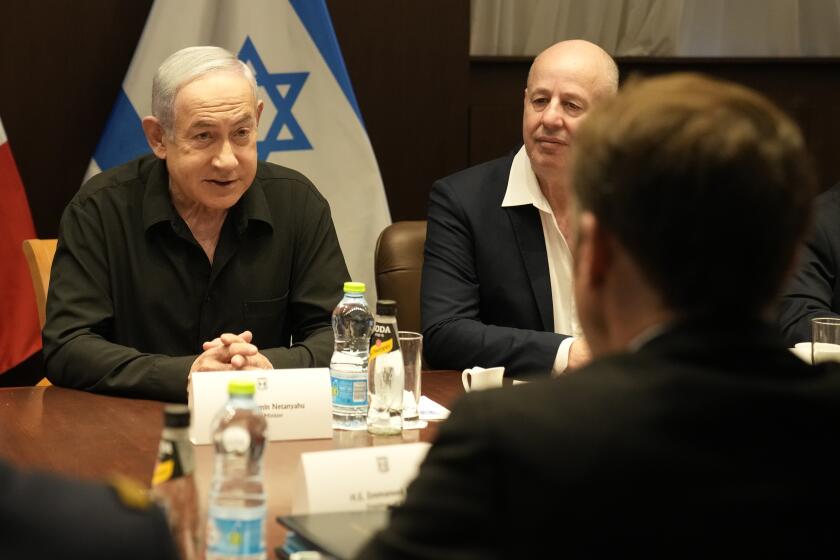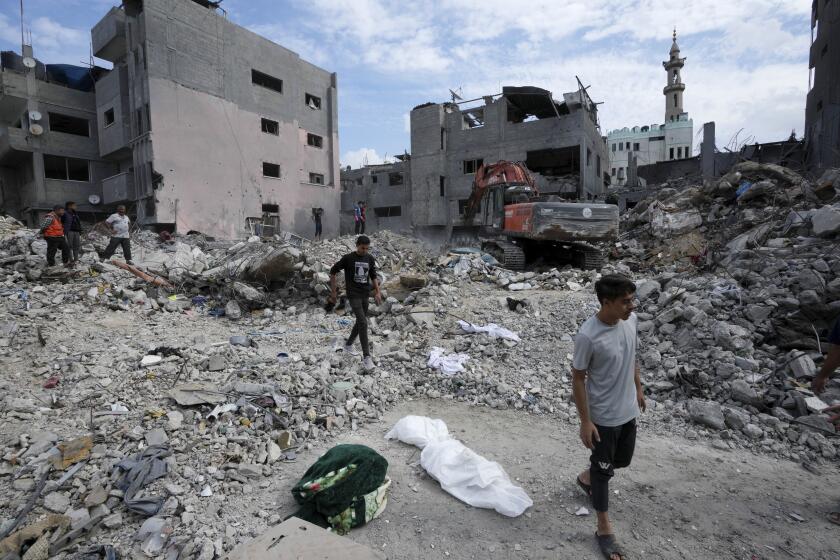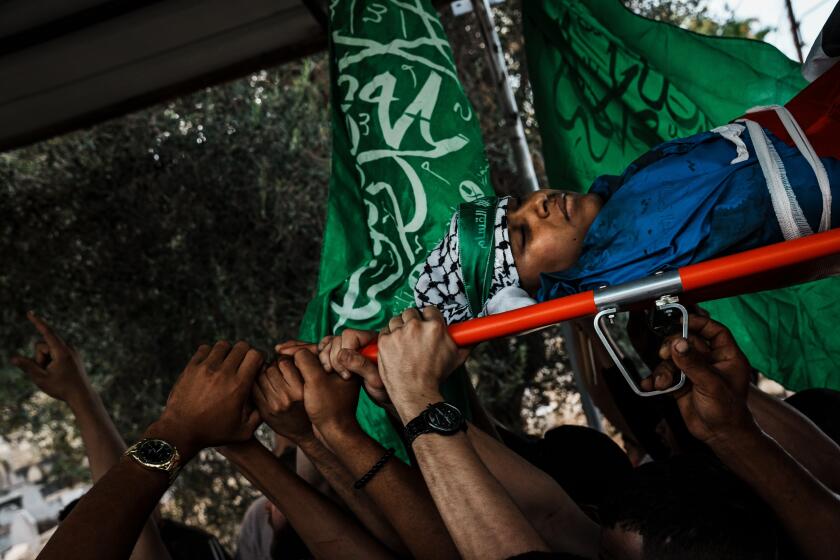31 premature babies evacuated from Gaza’s largest hospital but scores of trauma patients remain
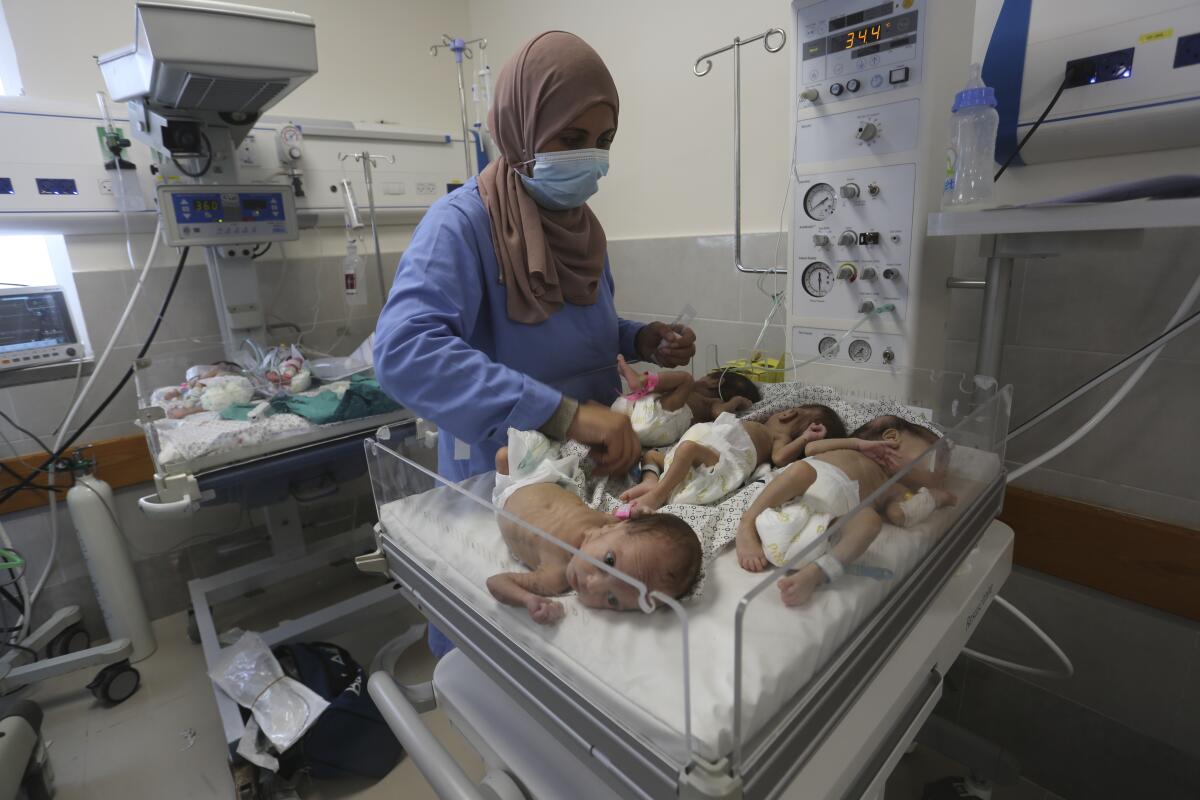
- Share via
KHAN YUNIS, Gaza Strip — Health officials said 31 premature babies in “extremely critical condition” were transferred safely Sunday from Gaza ‘s main hospital and will go to Egypt, while more than 250 patients with severely infected wounds and other urgent conditions remained stranded there days after Israeli forces entered the compound to look for Hamas operations there.
The plight of the babies, along with Israeli claims against Shifa Hospital, have become potent symbols in the devastating war between Israel and Hamas. An Israeli offensive has taken a heavy toll on Palestinian civilians, while Israel has accused Hamas of using Shifa and other hospitals as headquarters for military operations.
The newborns from the hospital, where power was cut and supplies ran out while Israeli forces battled Palestinian militants outside, were receiving urgent care in the southern Gaza city of Rafah. They suffered from dehydration, vomiting and hypothermia, and some had sepsis because they hadn’t received medication and had not been in “suitable conditions for them to stay alive,” said Mohamed Zaqout, director of Gaza hospitals. Four other babies died in the two days before the evacuation, he said.
A World Health Organization team that visited Shifa for an hour Saturday said hospital corridors were filled with medical and solid waste, increasing the risk of infection for patients who were “terrified for their safety and health, and pleaded for evacuation.” Twenty-five staff members stayed behind.
The U.N. agency said the vast majority of patients had amputations, burns or other trauma, and many wounds were severely infected, with antibiotics unavailable. Missions were being planned to evacuate the remaining people to southern Gaza in the next 24 to 72 hours, “pending guarantees of safe passage,” the WHO said.
A Times special correspondent in Gaza offers a personal account of living in a place where nowhere feels safe.
Later Sunday, Israel’s army said it had strong evidence supporting its claims that Hamas maintains a sprawling command post inside and under Shifa. Israel has portrayed the hospital as a key target in its war to end Hamas’ rule in Gaza following the militant group’s wide-ranging attack into southern Israel six weeks ago.
Later Sunday, Israel’s army said it had strong evidence supporting its claims that Hamas maintains a sprawling command post inside and under Shifa, part of its wider accusation that the fighters use civilians as cover. It has portrayed the hospital as a key target in its war to end Hamas’ rule in Gaza following the militant group’s wide-ranging attack in southern Israel six weeks ago.
The army said it had discovered a 60-yard tunnel about 33 feet under the hospital’s 20-acre complex, which includes several buildings, garages and a plaza. It said the tunnel included a staircase, blast-proof door and a firing hole that could be used by snipers. The army said it was still uncovering the tunnel’s route.
The Associated Press couldn’t independently verify Israel’s findings, which included security camera video showing what the military said were two foreign hostages, one Thai and one Nepalese, taken to the hospital after the Oct. 7 attack.
The army also said an independent medical report had determined that a female Israeli soldier, Cpl. Noa Marciano, whose body was recovered in Gaza last week, had been killed by Hamas in the hospital. Marciano had earlier been injured in an Israeli strike Nov. 9 that killed her captor, according to Israel’s intelligence assessment. The injuries were not life-threatening but she was then killed by a Hamas militant in Shifa, the army said,
Hamas and hospital staff earlier denied the allegations of a command post under Shifa, and critics have held up the hospital as emblematic of what they say is Israel’s reckless endangerment of civilians. Thousands have been killed in Israeli strikes, and there are severe shortages of food, water, medicine and fuel in the besieged territory.
Senior Hamas official Osama Hamdan dismissed the Israeli military’s announcement and didn’t deny that Gaza has hundreds of miles of tunnels. However, he said, “the Israelis said there was a command and control center, which means that the matter is greater than just a tunnel.”
Entire generations of Palestinian families in the besieged Gaza Strip have been killed in airstrikes in the ongoing Israel-Hamas war.
Hostage negotiations
Around 1,200 people have been killed on the Israeli side, Israel says, mainly civilians slain during Hamas’ Oct. 7 attack, in which the militants dragged some 240 captives back into Gaza and shattered Israel’s sense of security. The military says 63 Israeli soldiers have been killed, including 12 over the last 24 hours.
Hamas has released four hostages, Israel has rescued one, and the bodies of two hostages were found near Shifa where there had been heavy fighting.
A forensic investigator in Tel Aviv works to reassemble remains of victims of Hamas militants, trying to understand the causes of death and the underlying cruelty.
Israel-Hamas war: In a national vigil of sorts, Israelis hope for the return of more than 220 people seized by militants and believed held in Gaza.
Israel, the United States and the Persian Gulf nation of Qatar, which mediates with Hamas, have been negotiating over a hostage release for weeks.
“We are hopeful that we can get a significant number of hostages freed in the coming days,” Israel’s ambassador to the U.S., Michael Herzog, told ABC’s “This Week.” He added, “We’re talking about a pause in the fighting for a few days, so we can get the hostages out.”
Qatar’s prime minister, Sheikh Mohammed bin Abdulrahman al Thani, said Sunday that he was “confident” a deal would soon be reached, telling reporters that the “the sticking points, honestly, at this stage are more practical, logistical.”
Israeli Prime Minister Benjamin Netanyahu’s office said the three-member war cabinet would meet with representatives of the hostages’ families on Monday evening.
Israelis fault Prime Minister Benjamin Netanyahu for security failures that set the stage for war. Few see a path to leadership change amid the crisis.
Ship seized
Israel’s military said Yemen-based Houthi rebels had seized a cargo ship in the southern Red Sea en route from Turkey to India but said that no Israelis were on board and that it wasn’t an Israeli ship.
The Iranian-backed Houthis said they had seized an Israeli ship and crew and took the vessel to the Yemeni coast, but gave no details, other than to say it was treating the captives “in accordance with the teaching and values of our Islamic religion.”
The Bahamas-flagged Galaxy Leader is a vehicle carrier affiliated with an Israeli billionaire.
Heavy fighting in the north
Heavy clashes were reported in the built-up Jabaliya refugee camp in northern Gaza overnight into Sunday.
“There was the constant sound of gunfire and tank shelling,” Yassin Sharif, who is sheltering in a U.N.-run hospital in the camp, said by phone. “It was another night of horror.”
The commissioner-general of the U.N. agency for Palestinian refugees, Philippe Lazzarini, said 24 people were killed in what witnesses described as an Israeli airstrike on a school in a crowded U.N. shelter in Jabaliya the day before. The Israeli military, which has repeatedly called on Palestinians to leave northern Gaza, said only that its troops were active in the area “with the aim of hitting terrorists.”
“This war is having a staggering and unacceptable number of civilian casualties, including women and children, every day. This must stop,” U.N. Secretary-General Antonio Guterres said in a statement on that strike and another on a U.N.-run school within 24 hours.
Rescuers in Gaza don’t have the equipment, manpower or fuel to search properly for the living, let alone the dead buried among mounds of rubble.
More than 11,500 Palestinians have been killed, according to Palestinian health authorities. An additional 2,700 have been reported missing, believed buried under rubble. The count does not differentiate between civilians and combatants, but more than two-thirds of those killed were women and children, the authorities say. Israel says it has killed thousands of militants.
Attacks by Israeli forces and settlers have killed 215 Palestinians in the West Bank since the war began, according to Palestinian health officials.
Winter worsens misery
More than two-thirds of Gaza’s population of 2.3 million have fled their homes. The United Nations agency for Palestinian refugees, UNRWA, is struggling to provide basic services to hundreds of thousands of people sheltering in and around schools and other facilities. Seventeen of its facilities have been directly hit and 176 people reportedly killed, the agency said.
Their misery has worsened in recent days with the arrival of winter, as cold winds and driving rain buffet tent camps.
Violence surges in the West Bank as Israel increases raids to root out militants. Palestinians say the military is using the war as an excuse to crack down.
Over the weekend, Israel allowed UNRWA to import enough fuel to continue humanitarian operations for another couple of days, and to keep internet and telephone systems running. Israel, along with Egypt, had enforced a blockade on Gaza for 16 years, but after the Hamas attack, it ordered a “complete siege.” It cut off all fuel imports, causing Gaza’s sole power plant and most water treatment systems to shut down, leaving most residents without electricity or running water.
Defense Minister Yoav Gallant on Saturday gave the clearest indication yet that the military plans to expand its offensive to the south, where Israel has told Palestinian civilians to seek refuge. Israel has repeatedly struck what it says are militant targets across the south, often killing civilians.
The evacuation zone is already crowded with displaced civilians, and it was not clear where they would go if the offensive moved closer. Egypt has refused to accept any influx of Palestinian refugees, in part because of fears that Israel would not allow them to return.
Palestinian-Canadian Khalil Manaa, 71, left Gaza for Egypt on Sunday. After fleeing to southern Gaza, he said he and relatives shared a crammed home of 40 people. “And there, we also were subjected to intense strikes. … A rocket hit our house,” he said.
Jobain reported from Gaza, Magdy from Cairo.
More to Read
Sign up for Essential California
The most important California stories and recommendations in your inbox every morning.
You may occasionally receive promotional content from the Los Angeles Times.
